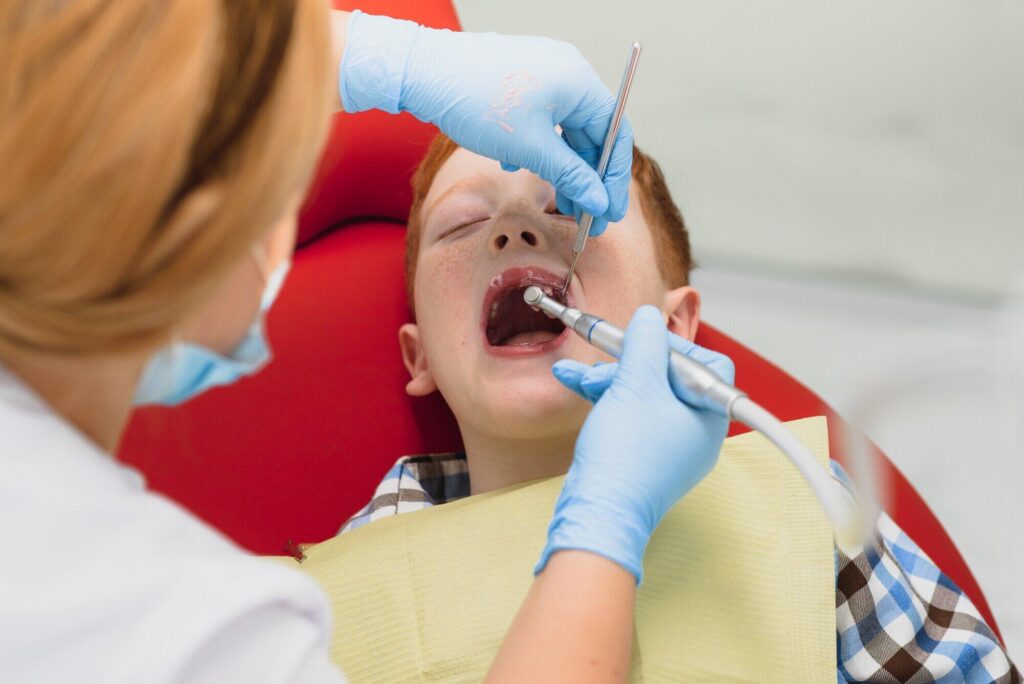Good dental habits start early. Pediatric oral health is key to keeping children’s teeth strong and healthy. Parents can guide their kids to brush, floss, and eat the right foods.
Simple routines at home make a big difference. Visiting the dentist regularly helps prevent problems before they start. Teaching children about oral care builds lifelong habits.
Read on to learn practical steps for keeping your child’s smile healthy and bright.
Early Teeth Care Matters
Teeth should be cleaned even before they fully come in. Use a soft cloth or small brush to wipe gums after feeding. This removes bacteria that can harm emerging teeth. Once teeth appear, brush twice a day with a tiny amount of toothpaste.
Encourage children to spit, not swallow, toothpaste. Start teaching brushing motions early to build muscle memory. Make it a fun activity to keep children engaged. Early care reduces the risk of cavities. Consistency at this stage sets the tone for healthy teeth.
Choosing the Right Toothbrush
Select a small toothbrush with soft bristles. Small heads reach all areas of the mouth. Replace toothbrushes every three months or when bristles fray. Show children how to brush in small circles.
Supervise brushing to ensure all teeth are cleaned. Use timers or songs to make brushing the right length. Encourage independence as children get older. Proper tools help prevent gum irritation. The right brush makes cleaning more effective and comfortable.
Toothpaste Tips for Kids
Use only a pea-sized amount of toothpaste for young children. Fluoride strengthens teeth and prevents decay. Teach children to spit out toothpaste after brushing. Avoid swallowing large amounts of toothpaste.
Make brushing a daily habit, not a chore. Show them how to spread toothpaste on the brush. Use fun flavors to keep them interested. Reinforce safety around toothpaste use. Simple habits now lead to long-term dental health.
Brushing Techniques for Children
Hold the brush at a 45-degree angle to gums. Brush the outer, inner, and chewing surfaces of teeth. Use gentle, small circles for effective cleaning. Encourage brushing for two minutes twice a day.
Make it a routine part of morning and bedtime. Teach children to reach the back teeth carefully. Supervise until they can brush properly on their own. Avoid harsh scrubbing that can damage gums. Proper technique prevents plaque and cavities.
Importance of Flossing Early
Flossing removes food between teeth where brushes cannot reach. Start flossing when two teeth touch. Use child-friendly flossers to make it easier. Show children the motion slowly and clearly.
Make flossing part of the nightly routine. Encourage patience to avoid frustration. Flossing prevents gum inflammation and cavities. Praise children for effort to build good habits. Regular flossing supports overall oral health.
Healthy Eating for Strong Teeth
Limit sugary snacks and drinks to prevent cavities. Offer fruits, vegetables, and dairy for strong teeth. Teach children to rinse with water after sweet foods. Balanced meals support teeth and gum growth.
Avoid sticky foods that cling to teeth. Encourage chewing fibrous foods to clean teeth naturally. Explain why sweets should be occasional treats. Lead by example with healthy choices. Nutrition directly affects pediatric oral health.
Managing Thumb Sucking and Pacifiers
Thumb sucking is normal in young children but should decrease by age four. Prolonged use can change teeth alignment. Offer positive alternatives to help children stop. Pacifiers should be limited as children grow.
Reward progress to encourage quitting habits. Avoid scolding, as it can increase stress. Talk to a dentist if teeth are affected. Early intervention prevents future dental problems. Consistency helps children adjust comfortably.
Recognizing Early Signs of Tooth Decay
Look for white or brown spots on teeth. Check for sensitivity to hot or cold foods. Early detection allows quick treatment. Encourage children to report discomfort. Visit the dentist if you notice changes.
Teach children to observe their own teeth. Small cavities are easier to treat than large ones. Prevention and monitoring save future dental visits. Awareness is the first step to prevention.
Scheduling First Dental Visits
Take children to the dentist by age one. Early visits introduce them to the dental environment. Dentists check for cavities and growth issues. Make visits routine to reduce fear. Explain what will happen in simple terms.
Praise children after appointments to reinforce positivity. Ask questions about care at home. Regular visits catch problems before they worsen. Early experience shapes lifelong dental habits.
Building a Brushing Routine
Consistency is key for pediatric oral health. Brush at the same times each day. Make it predictable and stress-free. Use songs or timers to track brushing time. Encourage children to participate actively.
Monitor technique and coverage. Offer gentle reminders rather than force. Praise progress to create motivation. Routine builds independence and responsibility.
Understanding Dental Anxiety
Some children fear dental visits. Anxiety can start early with new experiences. Prepare them with stories and role play. Stay calm during appointments to set an example. Use reassurance and positive language.
Avoid threats or warnings about pain. Offer comfort objects if needed. Gradual exposure reduces fear over time. Support helps children accept dentistry comfortably.
Benefits of Dental Sealants
Sealants cover grooves in back teeth to prevent decay. They are safe and pain-free. Dentists apply them during routine visits. Sealants last for years if maintained. They reduce the need for fillings.
Children continue normal brushing habits. Sealants are an extra protective layer. Discuss sealants with the dentist. Prevention reduces future dental procedures.
Fluoride and Pediatric Teeth
Fluoride strengthens enamel and prevents cavities. It is found in toothpaste and drinking water. Dentists may provide additional treatments. Teach children not to swallow fluoride toothpaste. Fluoride works best with regular brushing.
Limit foods that counteract its effects. Regular dental visits monitor fluoride use. It protects both baby and permanent teeth. Proper use builds strong resistance to decay.
Recognizing Gum Problems
Check for redness, swelling, or bleeding gums. Teach children to rinse gently. Encourage gentle brushing to avoid irritation. Healthy gums are pink and firm.
Gum problems can indicate poor cleaning habits. Address issues early with dental care. Flossing reduces gum inflammation. Consistent hygiene prevents disease. Observation helps maintain overall oral health.
Teaching Proper Mouth Rinsing
Rinse after meals to remove leftover food. Use water or a child-safe mouth rinse. Teach gentle swishing without swallowing. Rinsing complements brushing and flossing.
Encourage rinsing after sweets. Explain why it keeps teeth clean. Make it a fun, daily habit. Lead by example for children to follow. Regular rinsing prevents bacteria buildup.
Safe Use of Sports Mouthguards
Mouthguards protect teeth during sports. Choose one that fits well. Encourage consistent use during physical activity. Check for wear and replace if needed.
Explain the importance of protection to children. Clean the guard after each use. Store properly to avoid damage. Mouthguards reduce the risk of injury. Safety supports healthy teeth in active children.
The Role of Dentistry for Children
Regular dental care prevents serious problems. Dentistry for children focuses on comfort and prevention. Dentists guide parents on oral care routines. Visits may include cleaning, fluoride, and advice.
Children learn positive habits during appointments. Dentists monitor growth and teeth alignment. Early care reduces the need for future procedures. Families receive education tailored to age and needs. Ongoing support helps children maintain a healthy smile.
Handling Dental Emergencies
Keep calm during accidents. Clean minor cuts in the mouth. Apply gentle pressure for bleeding. For knocked-out teeth, keep them moist and seek care. Contact a dentist immediately.
Explain what happened to children calmly. Teach children not to chew hard objects. Quick response limits damage. Awareness reduces panic in urgent situations.
Encouraging Positive Dental Talk
Speak about dental visits positively. Avoid words that scare children. Reinforce that dentists help teeth stay healthy. Share your own positive experiences. Read books about visiting the dentist.
Praise bravery after appointments. Children adopt attitudes from caregivers. Positive talk reduces anxiety. Encouragement builds confidence for dental care.
Monitoring Permanent Teeth Growth
Keep track of new teeth as children grow. Permanent teeth usually start appearing around age six. Note any irregularities in alignment. Visit the dentist if spacing or crowding appears. Early intervention can prevent orthodontic issues.
Teach children to care for permanent teeth carefully. Avoid habits that can damage teeth. Regular checkups support proper development. Growth monitoring ensures long-term dental health.
Supporting Oral Health at School
Send healthy snacks for school days. Encourage water instead of sugary drinks. Teach proper cleaning after meals. Check for any issues noticed by teachers. Pack small toothbrush kits if possible.
Discuss oral health routines with caregivers. Reinforce hygiene habits consistently. School support complements home care. Healthy habits at school protect teeth daily.
Rewarding Good Habits
Positive reinforcement encourages consistency. Use praise, stickers, or small rewards. Celebrate progress without overemphasizing treats. Rewards reinforce effort, not outcomes. Keep encouragement simple and immediate.
Children respond better to recognition than criticism. Rotate reward types to maintain interest. Positive reinforcement builds long-term habits. Recognition motivates children to maintain routines.
Planning for Orthodontic Needs
Monitor teeth alignment over time. Discuss braces or corrective options with the dentist. Early evaluation can reduce future complications. Teach children patience during treatment. Support routine cleaning with braces.
Explain the importance of care for appliances. Encourage consistency in oral hygiene. Address concerns to prevent anxiety. Planning ensures a smooth transition to healthy adult teeth.
Teaching Dental Responsibility
As children grow, increase independence. Let them brush and floss with supervision. Encourage self-checks for clean teeth. Provide guidance, not pressure. Track routines together.
Praise effort and accountability. Explain consequences of neglecting teeth. Foster pride in a healthy smile. Responsibility builds lifelong dental habits.
Maintaining Oral Health Through Holidays
Special occasions bring sweets and treats. Teach moderation and brushing afterward. Rinse with water after sugary snacks. Encourage consistent routines even during holidays.
Plan healthy alternatives when possible. Set clear limits for candy consumption. Explain the effects of sugar on teeth. Keep dental care fun during celebrations. Consistent habits prevent cavities all year.
Teaching Kids About Sugar Impact
Explain how sugar can harm teeth. Show children how it causes cavities. Limit sugary drinks and snacks. Encourage rinsing or brushing after sweets. Use examples they understand, like sugar bugs.
Offer healthier alternatives like fruits. Praise choices that protect teeth. Teach moderation rather than complete avoidance. Understanding sugar impact helps children make better decisions.
Hydration and Oral Health
Drinking water supports clean teeth and gums. Water rinses food particles away. Encourage children to drink water throughout the day. Limit sodas or sweet drinks that can cause decay. Fluoridated water strengthens teeth.
Make water fun with cups or bottles kids like. Teach children to sip, not gulp, to avoid stomach upset. Staying hydrated helps overall health. Water supports pediatric oral health naturally.
Traveling With Healthy Habits
Keep toothbrushes and floss in travel kits. Maintain brushing routines while away from home. Pack healthy snacks to avoid sugary temptations. Teach children to rinse after meals. Find a dentist if a problem occurs while traveling.
Explain changes calmly to reduce stress. Make travel routines simple and consistent. Praise children for following habits. Consistent care prevents issues during trips.
Using Technology to Encourage Brushing
Use timers or apps to track brushing time. Fun visuals can motivate children. Set reminders for morning and night routines. Reward progress with positive feedback. Show videos of proper brushing techniques.
Use apps to track dental milestones. Encourage friendly competition with siblings. Teach responsibility while using technology. Technology can make pediatric oral health engaging and consistent.
Encouraging Regular Dental Checkups
Schedule visits every six months to monitor teeth. Early appointments catch problems before they worsen. Teach children that dentists help keep smiles healthy. Explain what will happen in simple terms.
Praise bravery during each visit. Build trust with positive experiences at the clinic. Discuss home care routines with the dentist. Consistent visits reduce fear and anxiety. Regular dental checkups support lifelong pediatric oral health.
Parents Must Invest inPediatric Oral Health
Pediatric oral health starts with simple, consistent habits. Brushing, flossing, and healthy eating build strong teeth. Regular dental visits prevent problems and teach lifelong care.
Parents guide children through routines and support positive attitudes. Awareness of early warning signs and proper tools protects smiles. Encouraging responsibility ensures children maintain good habits.
Following these steps helps families prevent issues, protect teeth, and enjoy bright, confident smiles.
Should you wish to discover other topics, check our blog!






